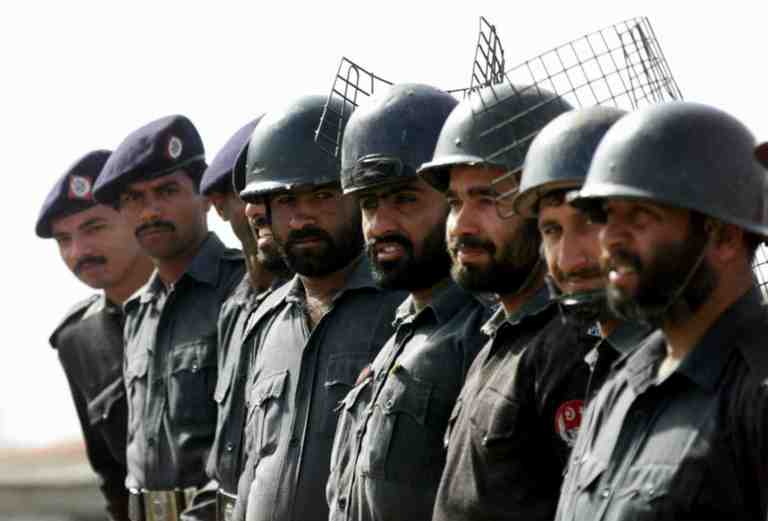Talat Hussain
Uncertain future for Pak-US relations

Pakistani security personnel, some wearing anti-riot helmets, stand guard near the venue of a meeting between visiting U.S. President Bill Clinton and Pakistani leaders in Islamabad on March 25, just hours before Clinton's historic visit to Pakistan. Photo: JASON REEDPresident Bill Clinton's recent visit to South Asia is likely to set the future course of interaction between Washington and Islamabad. The strong argument Pakistan's lobbyists were making in Washington for President Bill Clinton's visit to Pakistan centers on the negative: if President Clinton goes to South Asia, the argument run, and not visit Pakistan it would encourage India to toughen its position towards its adversary on the assumption that it has been abondoned by its long-time ally. It might also accentuate a sense of being dealt unfairly among Pakistan's conservative circles strengthening the hands of the extremist elements in Pakistan's policy making apparatus.
Stuck in a grim mode
Pak-US relations on the issue of terrorism are stuck in a grim mode. Increasingly it appears that the two sidesīs points of view are moving along more divergent lines than convergent ones.
The most troubling part of the problem is the US insistence that Pakistan closes down all madrissas, detains all those leaders whose hands are tainted with militant activities. Deliberations between the two countries so far have not yielded much understanding.
While general Pervaiz Musharraf has vowed to go to Afghanistan and the Americans are happy that he is making the right kind of signals, there is little hope that much will change even after the visit has taken place. The Pakistani establishment is in no position to deliver complete goods. By its own admission it does and can not control these groups a logic the military used during the Kargil war to ward off world pressure to call back the so called ējihaidiē holy warriors groups from the dizzying heights on the Line of Control.
Pressure on Pakistan
If President Clinton sent a strong message on these groups this can put the Pakistani rulers in a difficult domestic situation. They will either have to react negatively to the US presidentīs statement and thus run the risk of alienating Washington or will have swollow it and face the ire of the strong religious and jehadi lobbies in Pakistan.
Washington has been relentless in applying pressure on Pakistan to move decisively on controlling these groups particularly after the Kargil war and then the hijacking of the Indian plane.
Although not openly, Washington does tend to fasten the blame for both the crises at Pakistan's doorstep a fact India has been able to exploit to the hilt. Indians have been consistently projecting the negative implications of the two episodes on the world scene.
Delhi has justified its recent 28 p.c. increase in the defence budget, the largest single increase ever in any year, on the ground that the Kargil conflict has caused its security environment to worsen considerably.
The hijacking issue too has been kept alive. India has been telling Washington how the prisoners-for-passengers deal, which ended the hijack, has been a severe domestic blow to it. How the BJP government has come under immense pressure from the Opposition parties for caving in to the blackmail of the hijackers.
Real danger created by the highjacking
For all this India blames Pakistan which now has all of the three released prisoners. From Washington's point of view the real danger created by the hijacking concerns the bilateral equation between India and Pakistan.
While the hijacking lasted the two countries locked themselves in an un-edifying media war.
Indian commentators and officials through their interviews and statements made it clear that they had no doubt that the hijacking was the handiwork of Pakistan's Inter Service Intelligence, the ISI. One Indian commentator on the very first night of the hijacking held general Pervaiz Musharraf personally responsible for the hijacking.
Bilateral relations worsen
Washington sees the bilateral relations to worsen to the point of triggering off an actual conflict, even a nuclear conflict, something President Bill Clinton has underscored a few times in the recent months.
Washington now does not trust Pakistanīs word on the issue of controlling the jihadi groups and wants concrete action. This point will be the center of Clinton's agenda in Pakistan and he will ram it home with full force.
The other trouble spot happens to be American pressure on the issue of non-proliferation. Washington has been consistently arguing that Islmabad that it must freeze its activities to fish for nuclear material from North Korea. The lingering issue of the CTBT, on which the Musharraf government having started with great promise now seems to have got into a bog, is further complicating the matters between Pakistan and the US.
Terrorist state
Diplomats in Islamabad openly say that if Pakistanīs international image does not improve there is no guarantee that it will not be declared a terrorist state.
They also maintain that the issue of terrorism and non-proliferation will continue to define Pakistanīs international image and its ties with Washington.
The Musharraf government it appears needs to do some backbreaking work to protect itself against the heat that President Clintonīs visit will generate domestically.
Talat Hussain, Islamabad
Tillbaka till SYDASIEN/Monsun nr 1/00